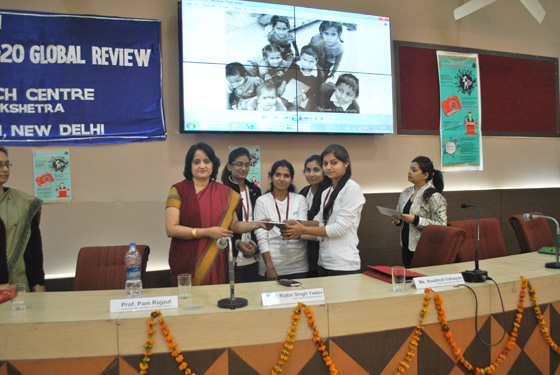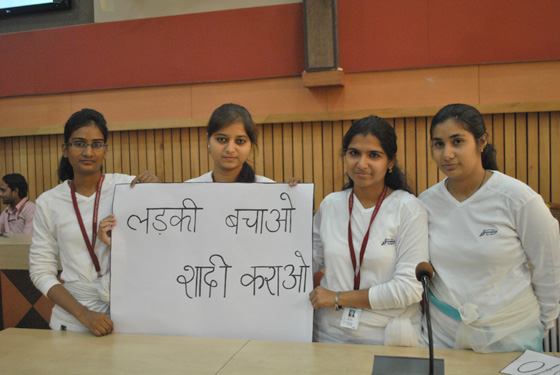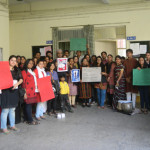The event was organized in collaboration with Women’s Studies Research Centre, Kurukshetra University. Ms. Anubhuti Vatsayan, Ms. Sonia Kaur Ghuman and Ms. Mehak Jhingon represented Centre for Social Research team.


Dr Reicha Tanwar, Head of the Department welcomed and addressed the participants on the theme. The panel was graced with the presence of Professor Pam Rajput,Chairperson, High Level Committee on the Status of Women, Government of India India. Pam Rajput, Ph.D. is an Indian academic turned internationally renowned activist who has been engaged in the women’s movement since the mid-70s both in India and internationally. She helped organize and was the first speaker of a “Women’s Parliament” that brought together over 500 women leaders from every part of India.


A recipient of many academic fellowships, she is a member of several expert committees and bodies in India including the nation’s: Planning Commission, Ministry of Women & Child Development, National Commission for Women, delegation to the UN Commission on the Status of Women, and many others. She talked about the historical background of Beijing + 20, how it all started, what the concerns today are and why youth’s involvement in it is required.


The faculty from Kurukshetra university also presented statistics on what is the current status of each area of concern that were chalked out in the Beijing Conference, and this acted as a perfect base to start the engagement process with the students present there.
Before opening the floor to the youth, the street play prepared by the students on girl child was presented.
Following are the recommendations that the students came up with:
Youth Recommendations
The Girl Child
- Strict implementation of PCPNDT Act and other related laws.
- Provision of equal property rights to be incorporated.
- Free insurance for girls at their birth.
- Mandatory self defense trainings to be incorporated in school and university curriculums.
Violence against women
- Gender sensitization workshops to be mandatory for all students and faculty to attend in schools and universities.
- The cyber crime unit should accept complaints online, rather than asking the aggrieved to submit a hard copy of the report.
- More user friendly women safety mobile applications must be floated in application stores and enough awareness and information should be raised regarding the same.
- Women should be made more aware of their rights, in particular the laws.
Women and Environment
- Environment policies should be women friendly.
- Privatization of natural resources should be restricted, so that the government can exercise regulations pertaining to distribution of resources women.
- Awareness generating programs on Women and Environment should be taken up at grassroots level, with special emphasis in rural areas.
- Women should have equal ownership rights in community property.
- Reservation of women in special economic zones.
Women and Media
- Success stories of women from grassroots should be aired on popular television channels, in lieu of some commercial advertisements.
- Issues highlighting importance of women and girls should be popularized through various media- print, digital, radio, etc.
- Media should highlight increasing areas of researches being explored by women, with an aim to encourage girls to take up research related studies.
- Inappropriate presentation of women though media should be strictly prohibited.
Women and Economy & Poverty
- Vocational training should be provided both at school as well as college level, so that after completion of academics, women are proficient and independent of their vocations, hence economically independent.
- Easier micro finance facilities should be provided to women, to ensure women’s engagement in economy.
- To ensure more participation of women in the economy, special provisions like cretches should be provided at all workplaces.
- More awareness campaigns should be taken up to promote equal women’s rights in paternal and matrimonial property.
Human Rights of Women& Women in Decision Making
- More participation of women at the decision making level, so that women are the ones taking important decisions on policies, programmes, laws, etc related to women.
- Proper checks and balances for implementation of policies and programs, with a special emphasis on gender audits.
- Encouraging decision making at home.
- Women with independent positions of authority must exercise their decision making powers irrespective of dominance of the males, be it family, society or workplace.
- More employment opportunities for women should be there, as unemployment is one of the main reasons for lack of women in decision making process.
Women in Armed Conflict
- Speedy trials in rape cases. Penalty for judiciary if a delay.
- Lowering the age bar for juvenile related crimes.
- Separate armed forces for women, of women.
- Criminal should be highlighted, not the survivor.
- Free RTI for women.
- Adequate rehabilitation provisions for women survivors of armed conflict.
- Gender sensitization for Police and armed forces.
Women and Health
- No of hospitals to be increased at all levels.
- Quality of medicines in Government hospitals should improve.
- Awareness on menstrual hygiene and reproductive rights should be incorporated at school level.
Education and training of women
- Government should monitor fee structures of all educational institutions.
- Ensuring proper implementation of schemes rolled out for women and girls.
- Basic facilities like of toilets should be stritctly provided by the school/university authorities.
- Free education should be made available to people from weaker sections of the society.
The program culminated with prize distribution and a vote of thanks from CSR to have made this event a success.




